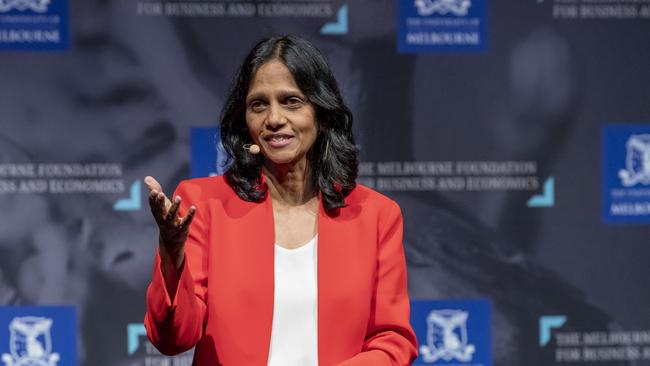Macquarie to buy Waddell & Reed for $US1.7bn
In the first major US acquisition for Macquarie in more than a decade, it has agreed to buy Waddell & Reed for $US1.7bn.

Macquarie Group will emerge among the top 25 US fund managers following its $US1.7bn ($2.3bn) move on Kansas City-based asset and wealth manager Waddell & Reed.
The transaction, in which Macquarie will pay $US25 cash for each Waddell & Reed share, marks the first major strategic play under chief executive Shemara Wikramanayake and follows Macquarie’s post-GFC playbook which saw the homegrown investment bank swoop on discounted fund managers.
The deal has been approved by both Macquarie’s and New York-listed Waddell & Reed’s boards of directors and is expected to close by mid-2021, subject to regulatory approval.
It comes just weeks after Ms Wikramanayake reaffirmed Macquarie’s acquisitive stance, saying it was seeking to capitalise on the COVID-19 market disruption and was actively looking for opportunities to deploy its $9bn war chest.
On completion of the transaction — its first major acquisition in the US in more than a decade — Macquarie will sell Waddell & Reed’s wealth management business to LPL Financial for $US300m.
It will then enter into a long-term partnership with LPL, the company told shareholders, with Macquarie set to become one of the advisory firm’s top-tier strategic asset management partners. The deal has also been approved by LPL, Macquarie said.
Bell Potter banking analyst TS Lim said the move to offload the wealth management business showed Macquarie ws focusing on what it was good at.
“They’re good at asset management, wealth is for someone else. But they’re keeping the relationship with LPL (to get the benefits of the wealth management business).”
Labelling it “a good deal” Mr Lim said the pricing was attractive and it would see contributions from the annuities-style componant of the business increase.
“So they’ll inrease the stable earnings base even more, which makes sense. It’s all about consistency of earnings which they’ve been shifting toward since the GFC.”
Macquarie said it expected the increased scale and diversification of the combined platform would create significant long-term benefits for clients, advisers and shareholders.
“The addition of Waddell & Reed and our enhanced partnership with LPL will significantly increase our ability to grow and invest in our combined business for the benefit of our clients” the head of Macquarie Asset Management, Martin Stanley, said.
“The consideration offered reflects the quality of Waddell & Reed’s business and the future benefits of our partnership with LPL.”
The acquisition will see Macquarie’s assets under management surge to $US465bn, catapulting it to within the top 25 US mutual fund managers.
Waddell & Reed, founded in 1937, provides investment management and wealth management services to clients throughout the US. It distributes investment products under the Ivy Investments brand as well as through independent financial advisers.
Its asset management business boasts $US68bn in assets under management, while its wealth management business has $US63bn in assets under advice.
Macquarie’s last major deal in the US was its $US428m acquisition of Delaware Investments back in 2009.
The timing of the two big deals is similar with both taking place in times of severe market dislocation.
Macquarie chief executive Shemara Wikramanayake only weeks ago reaffirmed the group’s acquisitive stance, saying it was seeking to capitalise on the market disruption caused by COVID-19 and was looking for ways to deploy its $9bn war chest.
“For now we are giving our businesses the backing in terms of funding, capital and empowerment and they are all actively looking in places where they think there should be opportunity,” she said.
“When the financial crisis happened it wasn’t immediately that the opportunities came up; we had to spend a lot of time reaching out, looking, finding the right things.”
The Waddell & Reed acquisition comes after much speculation that Macquarie would make a play for pressure wealth manager AMP, but the new deal suggests that it sees greater potential for growth outside of Australia.
Mr Lim said it now looked unlikely that Macquarie would go after AMP.
“This deal implies they found something better,” he said.
Macquarie already earns 68 per cent of income outside of its home market, with 31 per cent in the Americas and 25 per cent in Europe, the Middle East and Africa. Australia accounts for 32 per cent of its total income, and Asia rounds out at 12 per cent.
Macquarie shares were last down 0.17 per cent at $138.11.




To join the conversation, please log in. Don't have an account? Register
Join the conversation, you are commenting as Logout